2025年牛津译林版英语中考专题复习课件:课题一 冠词(34张PPT)
文档属性
| 名称 | 2025年牛津译林版英语中考专题复习课件:课题一 冠词(34张PPT) |

|
|
| 格式 | pptx | ||
| 文件大小 | 1.5MB | ||
| 资源类型 | 教案 | ||
| 版本资源 | 牛津译林版 | ||
| 科目 | 英语 | ||
| 更新时间 | 2025-03-10 00:00:00 | ||
图片预览

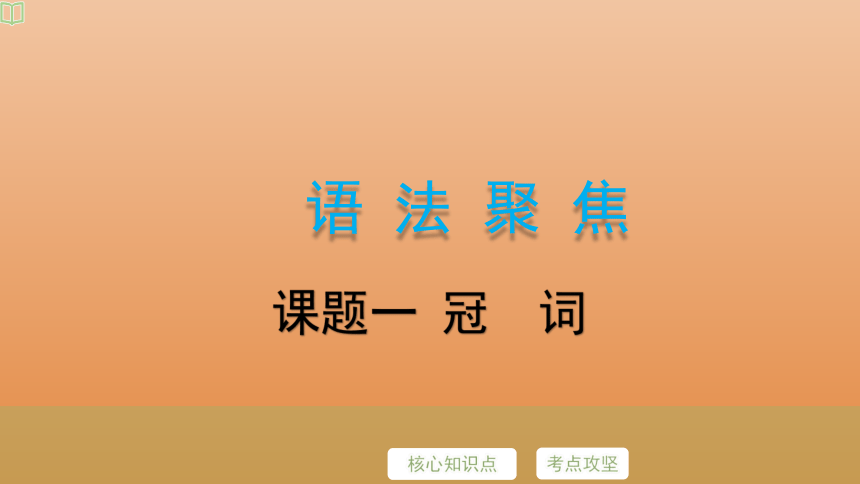
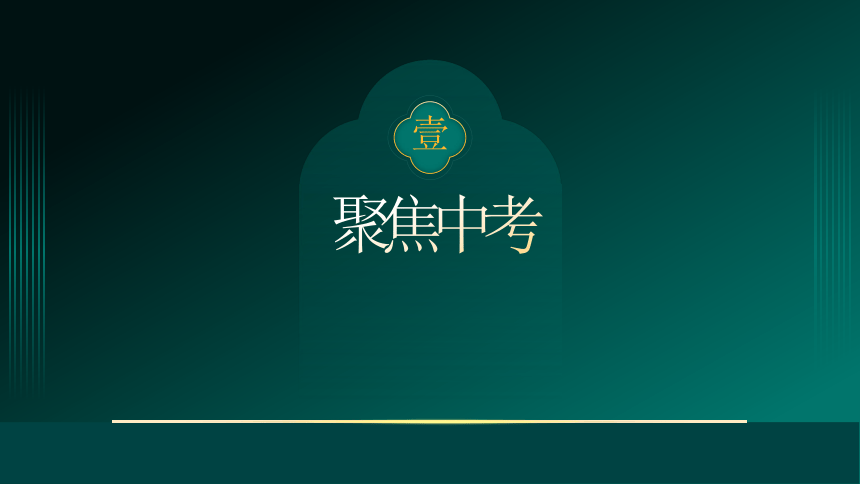
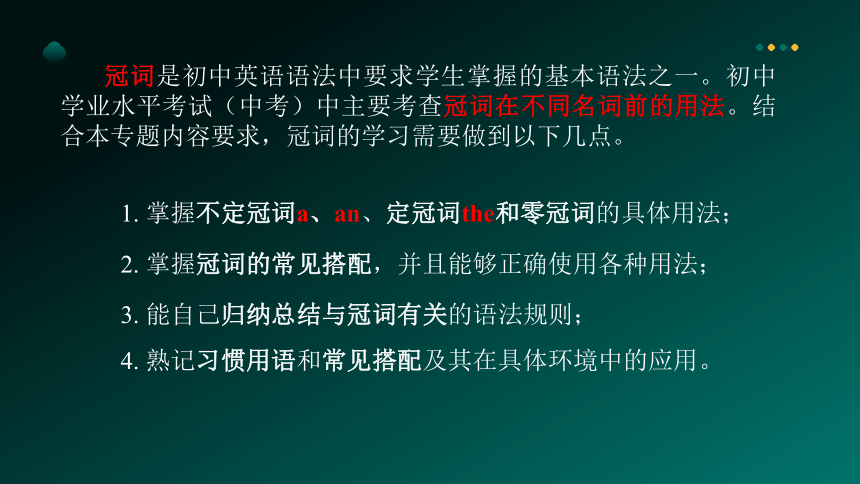
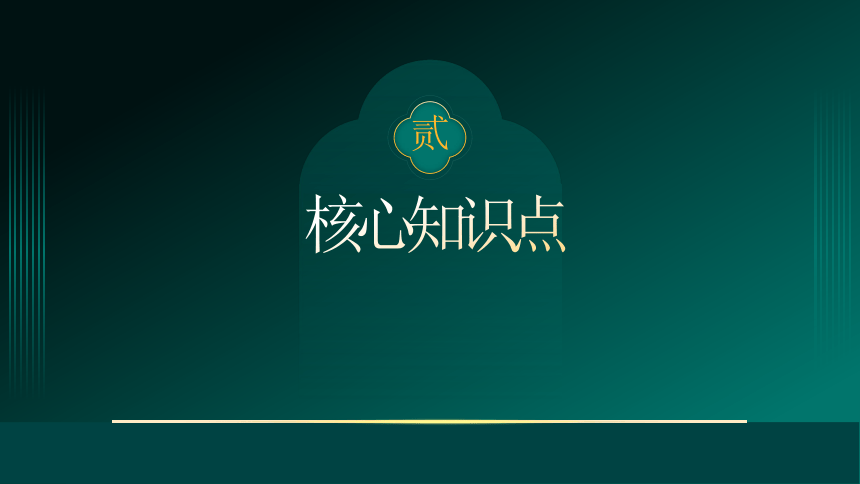
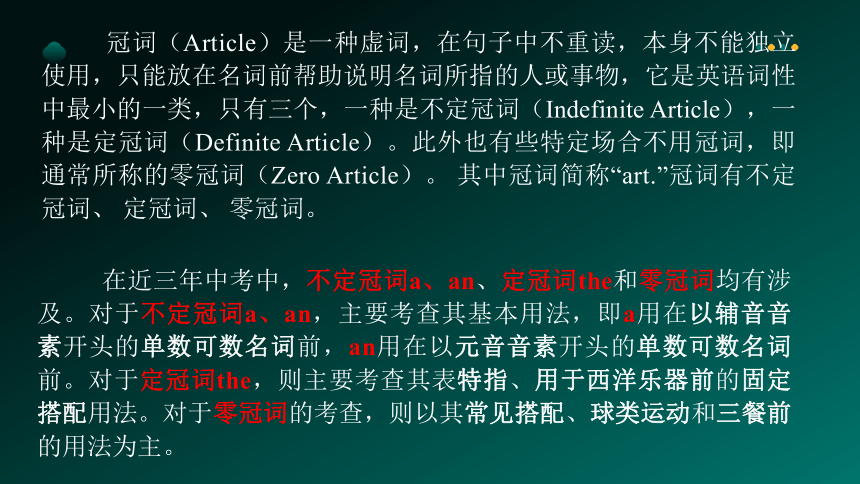
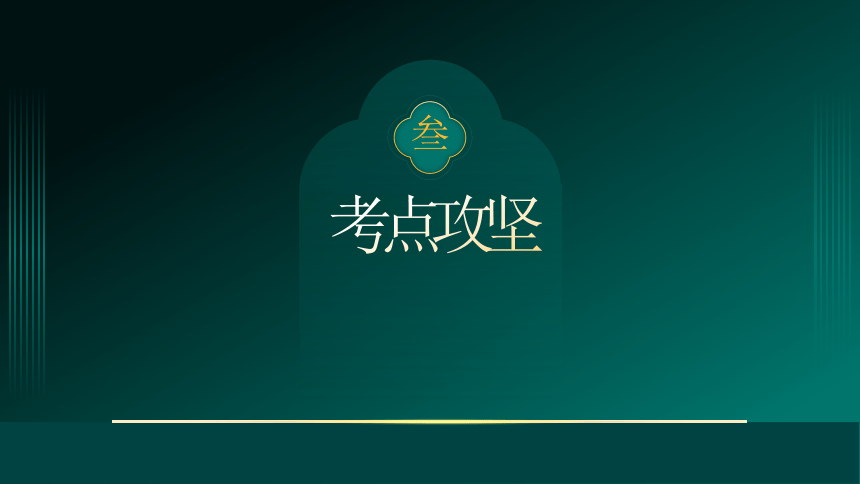
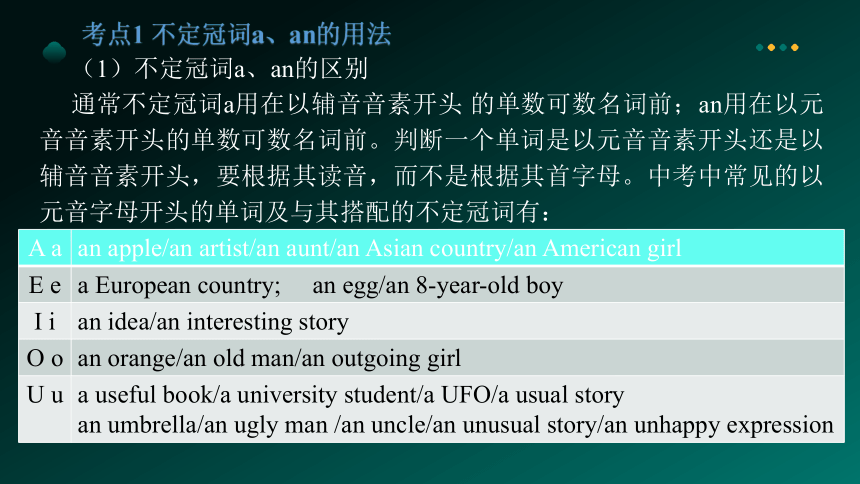
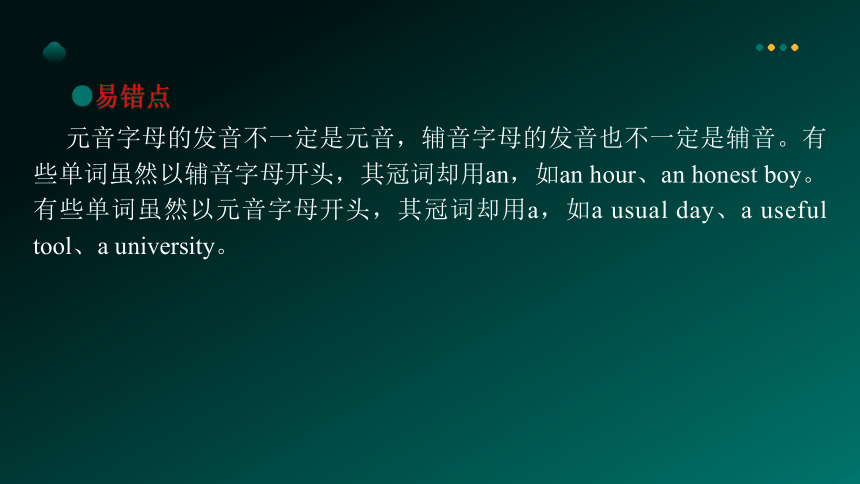
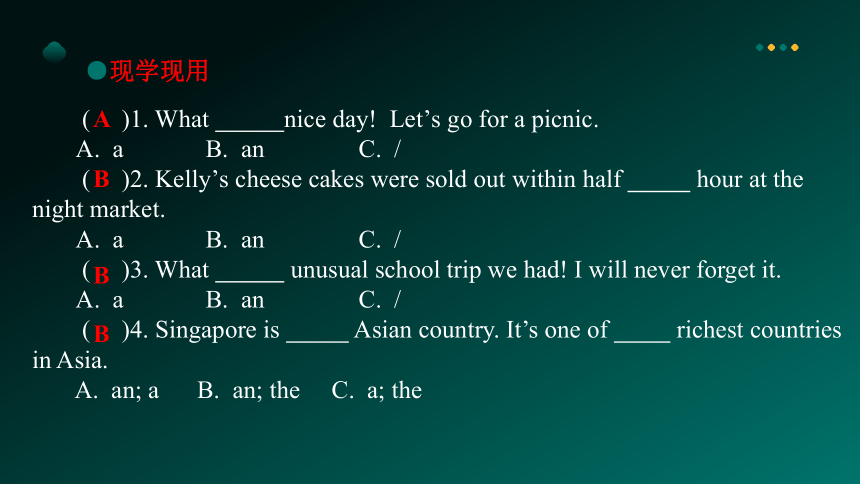
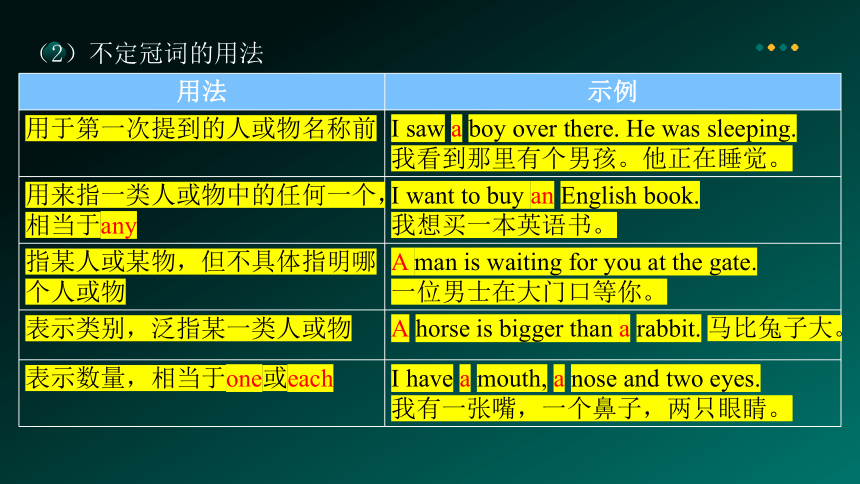
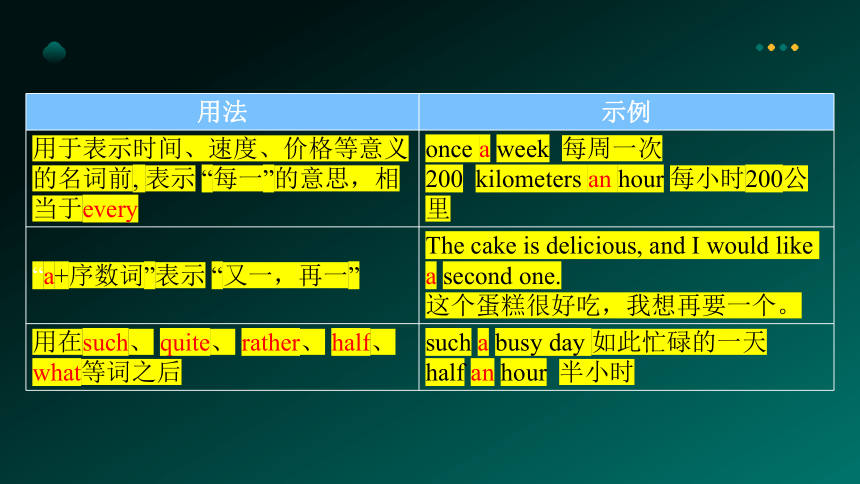
文档简介
(共34张PPT)
2025年英语中考复习
课题一 冠 词
语 法 聚 焦
聚焦中考
壹
冠词是初中英语语法中要求学生掌握的基本语法之一。初中学业水平考试(中考)中主要考查冠词在不同名词前的用法。结合本专题内容要求,冠词的学习需要做到以下几点。
1. 掌握不定冠词a、an、定冠词the和零冠词的具体用法;
2. 掌握冠词的常见搭配,并且能够正确使用各种用法;
3. 能自己归纳总结与冠词有关的语法规则;
4. 熟记习惯用语和常见搭配及其在具体环境中的应用。
核心知识点
贰
冠词(Article)是一种虚词,在句子中不重读,本身不能独立使用,只能放在名词前帮助说明名词所指的人或事物,它是英语词性中最小的一类,只有三个,一种是不定冠词(Indefinite Article),一种是定冠词(Definite Article)。此外也有些特定场合不用冠词,即通常所称的零冠词(Zero Article)。 其中冠词简称“art.”冠词有不定冠词、 定冠词、 零冠词。
在近三年中考中,不定冠词a、an、定冠词the和零冠词均有涉及。对于不定冠词a、an,主要考查其基本用法,即a用在以辅音音素开头的单数可数名词前,an用在以元音音素开头的单数可数名词前。对于定冠词the,则主要考查其表特指、用于西洋乐器前的固定搭配用法。对于零冠词的考查,则以其常见搭配、球类运动和三餐前的用法为主。
考点攻坚
叁
考点1 不定冠词a、an的用法
(1)不定冠词a、an的区别
通常不定冠词a用在以辅音音素开头 的单数可数名词前;an用在以元音音素开头的单数可数名词前。判断一个单词是以元音音素开头还是以辅音音素开头,要根据其读音,而不是根据其首字母。中考中常见的以元音字母开头的单词及与其搭配的不定冠词有:
A a an apple/an artist/an aunt/an Asian country/an American girl
E e a European country; an egg/an 8-year-old boy
I i an idea/an interesting story
O o an orange/an old man/an outgoing girl
U u a useful book/a university student/a UFO/a usual story
an umbrella/an ugly man /an uncle/an unusual story/an unhappy expression
●易错点
元音字母的发音不一定是元音,辅音字母的发音也不一定是辅音。有些单词虽然以辅音字母开头,其冠词却用an,如an hour、an honest boy。有些单词虽然以元音字母开头,其冠词却用a,如a usual day、a useful tool、a university。
●现学现用
( )1. What nice day! Let’s go for a picnic.
A. a B. an C. /
( )2. Kelly’s cheese cakes were sold out within half hour at the night market.
A. a B. an C. /
( )3. What unusual school trip we had! I will never forget it.
A. a B. an C. /
( )4. Singapore is Asian country. It’s one of richest countries in Asia.
A. an; a B. an; the C. a; the
A
B
B
B
(2)不定冠词的用法
用法 示例
用于第一次提到的人或物名称前 I saw a boy over there. He was sleeping.
我看到那里有个男孩。他正在睡觉。
用来指一类人或物中的任何一个,相当于any I want to buy an English book.
我想买一本英语书。
指某人或某物,但不具体指明哪个人或物 A man is waiting for you at the gate.
一位男士在大门口等你。
表示类别,泛指某一类人或物 A horse is bigger than a rabbit. 马比兔子大。
表示数量,相当于one或each I have a mouth, a nose and two eyes.
我有一张嘴,一个鼻子,两只眼睛。
用法 示例
用于表示时间、速度、价格等意义的名词前, 表示 “每一”的意思,相当于every once a week 每周一次
200 kilometers an hour 每小时200公里
“a+序数词”表示 “又一,再一” The cake is delicious, and I would like a second one.
这个蛋糕很好吃,我想再要一个。
用在such、 quite、 rather、 half、 what等词之后 such a busy day 如此忙碌的一天
half an hour 半小时
用法 示例
用在某些固定搭配中 a few/ little/ bit 一点儿
have a swim/ walk/ talk/ look/ dance/ drink/ rest =
swim/ walk/ talk/ look/ dance/ drink/ rest
游泳/ 散步/ 谈话/ 看一看/ 跳舞/ 喝点东西/ 休息
have a cold 感冒
have a good time 玩得高兴
in a hurry 匆忙
for a while 一会儿
keep a diary 写日记
do sb. a favor 帮助某人
●现学现用
( )5. You’ve dropped “s” in the word “necessary”.
A. / B. a C. an
( )6. Remember to be honest student when you’re doing this test. You must believe in yourself.
A. a B. an C. the
( )7. —What’s this, Tony —It’s orange.
A. a B. an C. the
( )8. —We have unusual Senior High School Entrance Examination this year.
—Yes. It’s one month later than before.
A. a B. an C. the
( )9. Take umbrella with you. It’s useful tool on rainy days.
A. an;a B. a;the C. an;the
C
B
B
B
A
考点2 定冠词the的用法
用法 示例
用于谈话双方都知道的人或事物前 Give me the book, please.
请给我这本书。
表示特指或用于上文已经提到的人或事物前 Do you know the girl in red?
你认识那个穿红色衣服的女孩吗?
用于表示乐器的名词之前 play the piano/drums/guitar
弹钢琴/敲鼓/弹吉他
用于某些形容词前,表示一类人,在意义上常是复数 the rich 富人
the poor 穷人
the old 老人
the young 年轻人
用法 示例
用在姓氏的复数形式前,指一家人或夫妇 the Smiths 史密斯一家
the Wangs 王先生一家
用于序数词及形容词或副词的最高级之前 The first lesson is very easy. 第一堂课很简单。
She is the most beautiful student in our class.
在我们班,她是最漂亮的学生。
用于表示世界上独一无二的东西前(如江河、海洋、湖泊、山脉、群岛等) The earth goes around the sun.
地球围绕太阳转。
the Pacific太平洋
the Changjiang River长江
用法 示例
用于由普通名词构成的一些表示机构、文娱场所、商店、设施等专有名词前 the Great Wall 长城
the Science Museum 科学博物馆
the Friendship Store 友谊商店
用于单数可数名词前,表示某一类人或事物 The dog is more useful than the cat.
狗比猫更有用。
与某些名词的所有格连用时,表示“在……处” at the doctor’s 在医院
用法 示例
用在某些固定搭配中 in the morning/ afternoon/ evening
在上午/在下午/在晚上
in the daytime 在白天 all the time 一直
at the same time 同时 all the year round 全年
at the beginning of 在……开始时
at the end of 在……结束时
in the end 在最后
by the way 顺便说一下
at the age of 在……岁时
in the middle of 在……中间
●口诀记忆
特指双熟悉, 上文已提及。
世上独无二,序数最高级。
某些专有名,习话及乐器。
●现学现用
( )1. —Who is she
—She is famous singer in China and has many fans.
A. the B. an D. a
( )2. —Do you know exact date of our art festival
—Yes, it’s on May 12.
A. a B. an C. the
( )3. —When did he become NBA player
—At the age of 17. And he was one of greatest players in the NBA.
A. a;the B. an;the C. an;a
C
C
B
( )4. —Amy, do you know Tom and his wife
—Of course. They play piano well.
A. a B. / C. the
( )5. —What’s matter with the old man
— He doesn’t feel well. He has high fever.
A. /; a B. the; a C. an; a
( )6. —Look at boy over there. He looks excited.
—Yeah, he has won first prize in the school English Reading& Writing.
A. the; a B. a; the C. the; the
( )7. —Do you know film Mulan
—Yes. It tells story of Hua Mulan who takes her father’s place to join the army.
A. the;the B. a;an C. the;an
C
B
C
A
考点3 零冠词的用法
用法 示例
在与by连用的交通工具名称前 by bike/ car/ bus/ train/ sea/ boat/ air/ plane/ subway
骑自行车/乘小汽车/公交车/火车/船/飞机/地铁
在一日三餐、语言、球类运动、学科、棋类、游戏等名词前 I went to school without breakfast.
我没吃早饭就去学校了。
He often plays football after school.
他放学后经常踢足球。
We all like English. 我们都喜欢英语。
在节日、季节、月份、星期前 June 1st is Children’s Day. 6月1日是儿童节。
The winter in 2013 was very cold. 2013年的冬天很冷。
名词前有物主代词、指示代词、不定代词、疑问代词或名词所有格修饰时 Every student likes English in our school.
我们学校每个学生都喜欢英语。
用法 示例
用在某些固定搭配中 day and night 日日夜夜
face to face 面对面
side by side 肩并肩
step by step 一步一步地
at first/last 首先/最后
at noon/ night/ dawn 在中午/晚上/黎明
at school/ work/ home 在学校/工作/家
in trouble/ danger 在困境/危险中
on duty/ watch 值日/值班
on time 准时
in time 及时
go to school/ work 去上学/工作
●口诀记忆
下列情况免冠词, 球类学科和三餐;
专有名词不可数, 星期月份季节前;
交通手段和节日, 习俗称谓和头衔。
●现学现用
( )1. To save time, many students have breakfast on their way to school.
A. a B. an C. /
( )2. —Do you go to school by bicycle every day
—No. I usually takes bus.
A. /; / B. /; the C. a; the
( )3. What good advice you’ve given me to keep healthy!
A. / B. a C. the
( )4. In 2016, China set April 24 as country’s Space Day.
A. the;the C. the;/ D. /;the
( )5. —Shall we play basketball this afternoon
—Good idea! Do you have basketball
A. the; a B. /; a C. a; an
C
B
A
C
B
考点4 有无冠词的差异
in hospital 住院 in the hospital 在医院里
go to sea 出海 go to the sea 去海边
in front of 在……(外部的)前面 in the front of 在……(内部的)前面
at table 进餐 at the table 在桌子旁
by sea 乘船 by the sea 在海边
go to school 上学 go to the school 到学校去
two of us 我们当中的两人 the two of us 我们两人(共计两人)
next year 明年 the next year 第二年
靶向突破
肆
●达标训练
Ⅰ. 请在空格内填上a或an。
1. ear
2. actor
3. hen
4. toy
5. university
6. elephant
7. hat
8. umbrella
9. rabbit
10. idea
11. hour
12. honest boy
13. interesting book
14. easy question
15. orange dress
an
an
a
a
a
an
a
an
a
an
an
an
an
an
an
Ⅱ. 单项选择。
( )1. We Chinese have the tradition of respecting old.
A. the B. a C. an
( )2. —Bob, who’s man with invitation in hand by the door
—He is my uncle.
A. /;a B. the; an C. the; a
( )3. —Can I have a look at iPhone your father bought yesterday
—Sure, and my father told me it was made in European country.
A. an; a B. the; an C. the; a
( )4. Lily is active girl and she likes playing chess.
A. a; / B. a; the C. an; /
( )5. —Lily is coming by plane tomorrow.
—Let’s go to airport to meet her.
A. a; a B. /; a C. /; the
A
B
C
C
C
( )6. Tianwen-1 probe(探测器) sents first picture of Mars back to China in 2021.
A. a B. an C. the
( )7. —What’s matter, Nancy —I have sore throat.
A. the;the B. the;a C. /; a
( )8. —My son seldom has breakfast.
—It is unhealthy habit. You must ask him to change it.
A. /; an B. the; an C. a; /
( )9. —What’s the most important tradition in Chinese family
—I think it’s to respect old and love young.
A. an; the B. an; a C. the; the
( )10. —Becky, do you know woman there
—Oh, she is my neighbor. She is excellent volunteer.
A. an; an B. the; an C. the; the
C
B
A
C
B
●真题训练
( )1. (2023 · 长沙) Beijing, capital of China, is city with a long history.
A. the; the B. a; a
C. the; a D. /; the
( )2. (2021 · 重庆) Zhang Guimei is kind teacher.
A. the B. a C. an D. /
( )3. (2020 · 武汉) It’s a nice day today! Let’s go for walk.
A. a B. an C. the D. /
( )4. (2021·金华)—What about job
—It is too difficult a job for me.
A. a B. an C. the
C
B
A
C
( )5.(2022·常州)—Jenny, why not go for picnic this Saturday
—Sounds great.
A. a B. an C. the
( )6. (2024·青岛)—Huang Wenxiu is good model of the new age.
—She was great! People all over country should learn from her.
A. a; / B. an; the C. a; the D. an; a
( )7.(2022·怀化) BYD, electric vehicle (车辆) maker in China, as sold its products to over 70 countries,
A. a B. an C. the D. /
A
C
B
( ) 8. (2022·杭州)—What nice day! Let’s take a walk along the river. —Sounds great.
A. a B. the C. /
( )9.(2023·大连) China’s panda Ya Ya finished 30-day stay in Shanghai after landing in China and then was sent to Beijing Zoo in May.
A. a; a B. a; the
C. the; a D. a; /
( )10.(2022·张家港)—Where did you go last week, Susan
—Sanya. My parents and I had enjoyable trip there.
A. a B. an C. the
A
D
B
知 识 梳 理
巩 固 训
2025年英语中考复习
课题一 冠 词
语 法 聚 焦
聚焦中考
壹
冠词是初中英语语法中要求学生掌握的基本语法之一。初中学业水平考试(中考)中主要考查冠词在不同名词前的用法。结合本专题内容要求,冠词的学习需要做到以下几点。
1. 掌握不定冠词a、an、定冠词the和零冠词的具体用法;
2. 掌握冠词的常见搭配,并且能够正确使用各种用法;
3. 能自己归纳总结与冠词有关的语法规则;
4. 熟记习惯用语和常见搭配及其在具体环境中的应用。
核心知识点
贰
冠词(Article)是一种虚词,在句子中不重读,本身不能独立使用,只能放在名词前帮助说明名词所指的人或事物,它是英语词性中最小的一类,只有三个,一种是不定冠词(Indefinite Article),一种是定冠词(Definite Article)。此外也有些特定场合不用冠词,即通常所称的零冠词(Zero Article)。 其中冠词简称“art.”冠词有不定冠词、 定冠词、 零冠词。
在近三年中考中,不定冠词a、an、定冠词the和零冠词均有涉及。对于不定冠词a、an,主要考查其基本用法,即a用在以辅音音素开头的单数可数名词前,an用在以元音音素开头的单数可数名词前。对于定冠词the,则主要考查其表特指、用于西洋乐器前的固定搭配用法。对于零冠词的考查,则以其常见搭配、球类运动和三餐前的用法为主。
考点攻坚
叁
考点1 不定冠词a、an的用法
(1)不定冠词a、an的区别
通常不定冠词a用在以辅音音素开头 的单数可数名词前;an用在以元音音素开头的单数可数名词前。判断一个单词是以元音音素开头还是以辅音音素开头,要根据其读音,而不是根据其首字母。中考中常见的以元音字母开头的单词及与其搭配的不定冠词有:
A a an apple/an artist/an aunt/an Asian country/an American girl
E e a European country; an egg/an 8-year-old boy
I i an idea/an interesting story
O o an orange/an old man/an outgoing girl
U u a useful book/a university student/a UFO/a usual story
an umbrella/an ugly man /an uncle/an unusual story/an unhappy expression
●易错点
元音字母的发音不一定是元音,辅音字母的发音也不一定是辅音。有些单词虽然以辅音字母开头,其冠词却用an,如an hour、an honest boy。有些单词虽然以元音字母开头,其冠词却用a,如a usual day、a useful tool、a university。
●现学现用
( )1. What nice day! Let’s go for a picnic.
A. a B. an C. /
( )2. Kelly’s cheese cakes were sold out within half hour at the night market.
A. a B. an C. /
( )3. What unusual school trip we had! I will never forget it.
A. a B. an C. /
( )4. Singapore is Asian country. It’s one of richest countries in Asia.
A. an; a B. an; the C. a; the
A
B
B
B
(2)不定冠词的用法
用法 示例
用于第一次提到的人或物名称前 I saw a boy over there. He was sleeping.
我看到那里有个男孩。他正在睡觉。
用来指一类人或物中的任何一个,相当于any I want to buy an English book.
我想买一本英语书。
指某人或某物,但不具体指明哪个人或物 A man is waiting for you at the gate.
一位男士在大门口等你。
表示类别,泛指某一类人或物 A horse is bigger than a rabbit. 马比兔子大。
表示数量,相当于one或each I have a mouth, a nose and two eyes.
我有一张嘴,一个鼻子,两只眼睛。
用法 示例
用于表示时间、速度、价格等意义的名词前, 表示 “每一”的意思,相当于every once a week 每周一次
200 kilometers an hour 每小时200公里
“a+序数词”表示 “又一,再一” The cake is delicious, and I would like a second one.
这个蛋糕很好吃,我想再要一个。
用在such、 quite、 rather、 half、 what等词之后 such a busy day 如此忙碌的一天
half an hour 半小时
用法 示例
用在某些固定搭配中 a few/ little/ bit 一点儿
have a swim/ walk/ talk/ look/ dance/ drink/ rest =
swim/ walk/ talk/ look/ dance/ drink/ rest
游泳/ 散步/ 谈话/ 看一看/ 跳舞/ 喝点东西/ 休息
have a cold 感冒
have a good time 玩得高兴
in a hurry 匆忙
for a while 一会儿
keep a diary 写日记
do sb. a favor 帮助某人
●现学现用
( )5. You’ve dropped “s” in the word “necessary”.
A. / B. a C. an
( )6. Remember to be honest student when you’re doing this test. You must believe in yourself.
A. a B. an C. the
( )7. —What’s this, Tony —It’s orange.
A. a B. an C. the
( )8. —We have unusual Senior High School Entrance Examination this year.
—Yes. It’s one month later than before.
A. a B. an C. the
( )9. Take umbrella with you. It’s useful tool on rainy days.
A. an;a B. a;the C. an;the
C
B
B
B
A
考点2 定冠词the的用法
用法 示例
用于谈话双方都知道的人或事物前 Give me the book, please.
请给我这本书。
表示特指或用于上文已经提到的人或事物前 Do you know the girl in red?
你认识那个穿红色衣服的女孩吗?
用于表示乐器的名词之前 play the piano/drums/guitar
弹钢琴/敲鼓/弹吉他
用于某些形容词前,表示一类人,在意义上常是复数 the rich 富人
the poor 穷人
the old 老人
the young 年轻人
用法 示例
用在姓氏的复数形式前,指一家人或夫妇 the Smiths 史密斯一家
the Wangs 王先生一家
用于序数词及形容词或副词的最高级之前 The first lesson is very easy. 第一堂课很简单。
She is the most beautiful student in our class.
在我们班,她是最漂亮的学生。
用于表示世界上独一无二的东西前(如江河、海洋、湖泊、山脉、群岛等) The earth goes around the sun.
地球围绕太阳转。
the Pacific太平洋
the Changjiang River长江
用法 示例
用于由普通名词构成的一些表示机构、文娱场所、商店、设施等专有名词前 the Great Wall 长城
the Science Museum 科学博物馆
the Friendship Store 友谊商店
用于单数可数名词前,表示某一类人或事物 The dog is more useful than the cat.
狗比猫更有用。
与某些名词的所有格连用时,表示“在……处” at the doctor’s 在医院
用法 示例
用在某些固定搭配中 in the morning/ afternoon/ evening
在上午/在下午/在晚上
in the daytime 在白天 all the time 一直
at the same time 同时 all the year round 全年
at the beginning of 在……开始时
at the end of 在……结束时
in the end 在最后
by the way 顺便说一下
at the age of 在……岁时
in the middle of 在……中间
●口诀记忆
特指双熟悉, 上文已提及。
世上独无二,序数最高级。
某些专有名,习话及乐器。
●现学现用
( )1. —Who is she
—She is famous singer in China and has many fans.
A. the B. an D. a
( )2. —Do you know exact date of our art festival
—Yes, it’s on May 12.
A. a B. an C. the
( )3. —When did he become NBA player
—At the age of 17. And he was one of greatest players in the NBA.
A. a;the B. an;the C. an;a
C
C
B
( )4. —Amy, do you know Tom and his wife
—Of course. They play piano well.
A. a B. / C. the
( )5. —What’s matter with the old man
— He doesn’t feel well. He has high fever.
A. /; a B. the; a C. an; a
( )6. —Look at boy over there. He looks excited.
—Yeah, he has won first prize in the school English Reading& Writing.
A. the; a B. a; the C. the; the
( )7. —Do you know film Mulan
—Yes. It tells story of Hua Mulan who takes her father’s place to join the army.
A. the;the B. a;an C. the;an
C
B
C
A
考点3 零冠词的用法
用法 示例
在与by连用的交通工具名称前 by bike/ car/ bus/ train/ sea/ boat/ air/ plane/ subway
骑自行车/乘小汽车/公交车/火车/船/飞机/地铁
在一日三餐、语言、球类运动、学科、棋类、游戏等名词前 I went to school without breakfast.
我没吃早饭就去学校了。
He often plays football after school.
他放学后经常踢足球。
We all like English. 我们都喜欢英语。
在节日、季节、月份、星期前 June 1st is Children’s Day. 6月1日是儿童节。
The winter in 2013 was very cold. 2013年的冬天很冷。
名词前有物主代词、指示代词、不定代词、疑问代词或名词所有格修饰时 Every student likes English in our school.
我们学校每个学生都喜欢英语。
用法 示例
用在某些固定搭配中 day and night 日日夜夜
face to face 面对面
side by side 肩并肩
step by step 一步一步地
at first/last 首先/最后
at noon/ night/ dawn 在中午/晚上/黎明
at school/ work/ home 在学校/工作/家
in trouble/ danger 在困境/危险中
on duty/ watch 值日/值班
on time 准时
in time 及时
go to school/ work 去上学/工作
●口诀记忆
下列情况免冠词, 球类学科和三餐;
专有名词不可数, 星期月份季节前;
交通手段和节日, 习俗称谓和头衔。
●现学现用
( )1. To save time, many students have breakfast on their way to school.
A. a B. an C. /
( )2. —Do you go to school by bicycle every day
—No. I usually takes bus.
A. /; / B. /; the C. a; the
( )3. What good advice you’ve given me to keep healthy!
A. / B. a C. the
( )4. In 2016, China set April 24 as country’s Space Day.
A. the;the C. the;/ D. /;the
( )5. —Shall we play basketball this afternoon
—Good idea! Do you have basketball
A. the; a B. /; a C. a; an
C
B
A
C
B
考点4 有无冠词的差异
in hospital 住院 in the hospital 在医院里
go to sea 出海 go to the sea 去海边
in front of 在……(外部的)前面 in the front of 在……(内部的)前面
at table 进餐 at the table 在桌子旁
by sea 乘船 by the sea 在海边
go to school 上学 go to the school 到学校去
two of us 我们当中的两人 the two of us 我们两人(共计两人)
next year 明年 the next year 第二年
靶向突破
肆
●达标训练
Ⅰ. 请在空格内填上a或an。
1. ear
2. actor
3. hen
4. toy
5. university
6. elephant
7. hat
8. umbrella
9. rabbit
10. idea
11. hour
12. honest boy
13. interesting book
14. easy question
15. orange dress
an
an
a
a
a
an
a
an
a
an
an
an
an
an
an
Ⅱ. 单项选择。
( )1. We Chinese have the tradition of respecting old.
A. the B. a C. an
( )2. —Bob, who’s man with invitation in hand by the door
—He is my uncle.
A. /;a B. the; an C. the; a
( )3. —Can I have a look at iPhone your father bought yesterday
—Sure, and my father told me it was made in European country.
A. an; a B. the; an C. the; a
( )4. Lily is active girl and she likes playing chess.
A. a; / B. a; the C. an; /
( )5. —Lily is coming by plane tomorrow.
—Let’s go to airport to meet her.
A. a; a B. /; a C. /; the
A
B
C
C
C
( )6. Tianwen-1 probe(探测器) sents first picture of Mars back to China in 2021.
A. a B. an C. the
( )7. —What’s matter, Nancy —I have sore throat.
A. the;the B. the;a C. /; a
( )8. —My son seldom has breakfast.
—It is unhealthy habit. You must ask him to change it.
A. /; an B. the; an C. a; /
( )9. —What’s the most important tradition in Chinese family
—I think it’s to respect old and love young.
A. an; the B. an; a C. the; the
( )10. —Becky, do you know woman there
—Oh, she is my neighbor. She is excellent volunteer.
A. an; an B. the; an C. the; the
C
B
A
C
B
●真题训练
( )1. (2023 · 长沙) Beijing, capital of China, is city with a long history.
A. the; the B. a; a
C. the; a D. /; the
( )2. (2021 · 重庆) Zhang Guimei is kind teacher.
A. the B. a C. an D. /
( )3. (2020 · 武汉) It’s a nice day today! Let’s go for walk.
A. a B. an C. the D. /
( )4. (2021·金华)—What about job
—It is too difficult a job for me.
A. a B. an C. the
C
B
A
C
( )5.(2022·常州)—Jenny, why not go for picnic this Saturday
—Sounds great.
A. a B. an C. the
( )6. (2024·青岛)—Huang Wenxiu is good model of the new age.
—She was great! People all over country should learn from her.
A. a; / B. an; the C. a; the D. an; a
( )7.(2022·怀化) BYD, electric vehicle (车辆) maker in China, as sold its products to over 70 countries,
A. a B. an C. the D. /
A
C
B
( ) 8. (2022·杭州)—What nice day! Let’s take a walk along the river. —Sounds great.
A. a B. the C. /
( )9.(2023·大连) China’s panda Ya Ya finished 30-day stay in Shanghai after landing in China and then was sent to Beijing Zoo in May.
A. a; a B. a; the
C. the; a D. a; /
( )10.(2022·张家港)—Where did you go last week, Susan
—Sanya. My parents and I had enjoyable trip there.
A. a B. an C. the
A
D
B
知 识 梳 理
巩 固 训
同课章节目录
- 词法
- 名词
- 动词和动词短语
- 动词语态
- 动词时态
- 助动词和情态动词
- 非谓语动词
- 冠词
- 代词
- 数词和量词
- 形容词副词及其比较等级
- 介词和介词短语
- 连词和感叹词
- 构词法
- 相似、相近词比较
- 句法
- 陈述句
- 一般疑问句和否定疑问句
- 特殊疑问句及选择疑问句
- 反意疑问句
- 存在句(There be句型)
- 宾语从句
- 定语从句
- 状语从句
- 主谓一致问题
- 简单句
- 并列句
- 复合句
- 主谓一致
- 主、表语从句
- 名词性从句
- 直接引语和间接引语
- 虚拟语气
- 感叹句
- 强调句
- 倒装句
- 祈使句
- 句子的成分
- 句子的分类
- 题型专区
- 单项选择部分
- 易错题
- 完形填空
- 阅读理解
- 词汇练习
- 听说训练
- 句型转换
- 补全对话
- 短文改错
- 翻译
- 书面表达
- 任务型阅读
- 语法填空
- 其他资料
